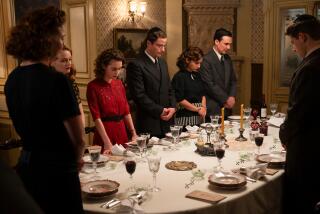Review: Brothers face Poland’s dark history in ‘Aftermath’
“Aftermath” is a bombshell disguised as a thriller. Its devastating story involves Jews and the Holocaust, yet not a single Jewish character appears on-screen. Instead there are only Poles, grappling to different degrees with a history that is as difficult as it is complex.
If the celebrated William Faulkner quote “The past is never dead, it’s not even past” is true anywhere, it’s in Poland, where this film was made and caused a national sensation. The narratives of competing victimization between Poles and the international Jewish community over who suffered most during World War II remain unresolved even decades after the fact, and it is into this maelstrom that “Aftermath” has inserted itself. Not as a polemic but rather as an especially effective film noir.
It was the excellent notion of writer-director Wladyslaw Pasikowski to use the true story of what happened in the Polish town of Jedwabne, an incident revealed in historian Jan Gross’ equally controversial 2000 book “Neighbors,” as the inspiration for a fictional drama. If you don’t know what happened in Jedwabne, don’t look it up, for one of the pleasures of this brooding, disturbing film is how adroitly and carefully it reveals its secrets.
“Aftermath” opens with the return to Poland after a 20-year absence of Franek Kalina (Ireneusz Czop). He’s not happy being back, but as it turns out Franek isn’t happy about much of anything. A dour, contentious individual, he’s been living in Chicago all this time, but instead of delivering encomiums about the land of the free, he tells the airport taxi driver, “They sure don’t let a Pole make an honest buck over there.”
The “they” turns out to refer to the Jews, and Franek, in addition to everything else, is a reflexive anti-Semite, casually referring to Jews as “Yids” and grumbling about how difficult they make his economic life.
Franek has returned to an unnamed rural town to visit his brother, Jozek (Maciej Stuhr, the son of Polish star Jerzy Stuhr), because Jozek’s wife and children have abruptly moved to Chicago and refused to tell anyone why they have abandoned Jozek and their homeland. Franek has shown up to find out what scared them off.
Jozek, however, is not the forthcoming type. As surly as his brother, he has angry gripes of his own, like the way Franek abandoned their parents to immigrate to the U.S. and didn’t even return for their funerals. Though he won’t say why, Jozek is also noticeably on edge: He keeps an ax near for protection and is not surprised when a rock gets thrown through his window late at night.
It doesn’t take long, however, for Franek to find out what seems to be behind this. His brother has made it his mission to collect the town’s Jewish gravestones. They were uprooted when the Nazis destroyed the Jewish cemetery during the war and, as was not uncommon across Eastern Europe, repurposed as paving stones around town.
CRITICS’ PICKS: What to watch, where to go, what to eat
This work has made Jozek persona non grata in his town, but even he cannot explain to his brother why he is doing it. “They were human beings,” is the best he can do. “There is no one left to look after them.”
In a less complex work, this discovery might be the film’s dramatic climax, but in “Aftermath” it is just the beginning of the story. Gradually, and much against their will, the brothers find out more and more about their town’s history, revealing secret after unthinkable secret.
One of the most effective of “Aftermath’s” notions is to make the investigators not the classic righteous Gentiles of so many Holocaust movies but angry, dissatisfied, antisocial, even borderline anti-Semitic individuals drawn into a quest for the truth almost against their will.
Strongly acted by Stuhr, Czop and a capable supporting cast, “Aftermath” succeeds, as films like this rarely do, on both the plot level (Pasikowski’s earlier thriller, “Psy,” was a major hit in Poland) and in its ability to be sensitive to the issues involved. Though its sensibility is different, “Aftermath” shares with “12 Years a Slave” a willingness to be unblinking in the face of great evil.
That this film could be made in Poland with a Polish cast and crew has turned “Aftermath” into a significant milestone in that country’s ongoing process of wrestling with its demons. It’s almost as if the truth has a will of its own, refusing to stay buried. What Jozek told his brother about the tombstones — “there is no one left to look after them” — connects to the awful truth behind this film as well.
------------------------
‘Aftermath’
MPAA rating: None
Running time: 1 hour, 44 minutes
Playing: Laemmle’s Royal, West Los Angeles; Town Center 5, Encino; Playhouse 7, Pasadena
More to Read
Only good movies
Get the Indie Focus newsletter, Mark Olsen's weekly guide to the world of cinema.
You may occasionally receive promotional content from the Los Angeles Times.







